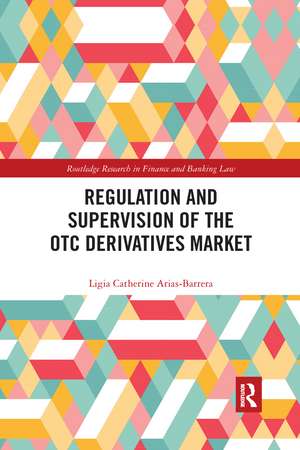Regulation and Supervision of the OTC Derivatives Market: Routledge Research in Finance and Banking Law
Autor Ligia Catherine Arias-Barreraen Limba Engleză Paperback – 14 aug 2020
This book, for the first time, analyses the regulatory response of the United Kingdom and the United States, the two largest centres of OTC derivatives transactions, and highlights their shortcomings. The book uses a normative risk-based approach to regulation as a methodological lens to analyse the UK regime of CCPs in the OTC derivatives market. It specifically focuses on prudential supervision and conduct of business rules governing OTC derivatives transactions and the move towards enhancing the use of central clearing. The resulting analysis, from a normative risk based approach, suggests that the UK regime for CCPs does not fulfil what would be expected if a coherent risk based approach was taken.
Our comments on the Dodd-Frank Act highlight that the incoherent adoption of risk-based approach to regulation affects the effectiveness of the US regime for CCPs. Such a regime does not follow the pace of events of ‘innovation risk’; in particular, the foreseeable changes FinTech will bring to the OTCDM and central clearing services. The second inadequacy of the US regime concerns the dual regulatory structure of the CFTC and the SEC, and the inadequate adoption of different and not well-coordinated regulatory strategies. We also analyse the cross-border implications of the US regime for non-US CCPs that provide clearing services to US market participants. Finally, we study the negative effects of the absence of a clearly defined resolution regime for CCPs.
| Toate formatele și edițiile | Preț | Express |
|---|---|---|
| Paperback (1) | 403.26 lei 6-8 săpt. | |
| Taylor & Francis – 14 aug 2020 | 403.26 lei 6-8 săpt. | |
| Hardback (1) | 765.84 lei 6-8 săpt. | |
| Taylor & Francis – 9 mai 2018 | 765.84 lei 6-8 săpt. |
Din seria Routledge Research in Finance and Banking Law
-
 Preț: 296.25 lei
Preț: 296.25 lei -
 Preț: 313.17 lei
Preț: 313.17 lei -
 Preț: 295.91 lei
Preț: 295.91 lei -
 Preț: 324.77 lei
Preț: 324.77 lei -
 Preț: 325.49 lei
Preț: 325.49 lei -
 Preț: 325.64 lei
Preț: 325.64 lei - 18%
 Preț: 1002.68 lei
Preț: 1002.68 lei -
 Preț: 412.37 lei
Preț: 412.37 lei - 18%
 Preț: 892.30 lei
Preț: 892.30 lei - 18%
 Preț: 891.36 lei
Preț: 891.36 lei -
 Preț: 483.49 lei
Preț: 483.49 lei - 31%
 Preț: 765.45 lei
Preț: 765.45 lei -
 Preț: 490.62 lei
Preț: 490.62 lei -
 Preț: 389.66 lei
Preț: 389.66 lei -
 Preț: 417.96 lei
Preț: 417.96 lei -
 Preț: 354.33 lei
Preț: 354.33 lei - 18%
 Preț: 1108.10 lei
Preț: 1108.10 lei -
 Preț: 416.22 lei
Preț: 416.22 lei -
 Preț: 476.69 lei
Preț: 476.69 lei - 18%
 Preț: 1000.27 lei
Preț: 1000.27 lei - 18%
 Preț: 1000.27 lei
Preț: 1000.27 lei -
 Preț: 389.38 lei
Preț: 389.38 lei -
 Preț: 389.66 lei
Preț: 389.66 lei - 18%
 Preț: 1000.27 lei
Preț: 1000.27 lei - 12%
 Preț: 312.43 lei
Preț: 312.43 lei - 18%
 Preț: 1117.07 lei
Preț: 1117.07 lei - 26%
 Preț: 765.84 lei
Preț: 765.84 lei - 18%
 Preț: 898.57 lei
Preț: 898.57 lei - 18%
 Preț: 896.26 lei
Preț: 896.26 lei - 18%
 Preț: 1002.63 lei
Preț: 1002.63 lei -
 Preț: 405.66 lei
Preț: 405.66 lei - 18%
 Preț: 1057.89 lei
Preț: 1057.89 lei - 18%
 Preț: 836.89 lei
Preț: 836.89 lei - 18%
 Preț: 1051.55 lei
Preț: 1051.55 lei - 18%
 Preț: 1000.27 lei
Preț: 1000.27 lei
Preț: 403.26 lei
Nou
Puncte Express: 605
Preț estimativ în valută:
77.17€ • 80.94$ • 64.24£
77.17€ • 80.94$ • 64.24£
Carte tipărită la comandă
Livrare economică 01-15 aprilie
Preluare comenzi: 021 569.72.76
Specificații
ISBN-13: 9780367590925
ISBN-10: 0367590921
Pagini: 294
Dimensiuni: 156 x 234 x 18 mm
Greutate: 0.78 kg
Ediția:1
Editura: Taylor & Francis
Colecția Routledge
Seria Routledge Research in Finance and Banking Law
Locul publicării:Oxford, United Kingdom
ISBN-10: 0367590921
Pagini: 294
Dimensiuni: 156 x 234 x 18 mm
Greutate: 0.78 kg
Ediția:1
Editura: Taylor & Francis
Colecția Routledge
Seria Routledge Research in Finance and Banking Law
Locul publicării:Oxford, United Kingdom
Public țintă
Postgraduate and UndergraduateCuprins
Contents
List of Figures
List of Cases
Acknowledgements
List of Abbreviations
Chapter 1 Introduction
Chapter 2: The Risk-Based Approach to Regulation
Chapter 3: Shortcomings of the UK Regime of CCPs in the OTC Derivatives Market
Chapter 4: Shortcomings—The Insufficient Legal Framework Underpinning CCPs’ Operations and the Absence of a Special Resolution Regime for CCPs
Chapter 5: Shortcomings—Failure to Rule Innovation Risk
Chapter 6: Comments on the US Derivatives Market’ Regulation for CCPs
Chapter 7: Final Remarks
Bibliography
Index
List of Figures
List of Cases
Acknowledgements
List of Abbreviations
Chapter 1 Introduction
Chapter 2: The Risk-Based Approach to Regulation
Chapter 3: Shortcomings of the UK Regime of CCPs in the OTC Derivatives Market
Chapter 4: Shortcomings—The Insufficient Legal Framework Underpinning CCPs’ Operations and the Absence of a Special Resolution Regime for CCPs
Chapter 5: Shortcomings—Failure to Rule Innovation Risk
Chapter 6: Comments on the US Derivatives Market’ Regulation for CCPs
Chapter 7: Final Remarks
Bibliography
Index
Notă biografică
Ligia Catherine Arias-Barrera holds a Ph.D. in Law from the University of
Warwick, and an LL.M in Commercial and Corporate Law from Queen Mary
University of London. She is Associate Professor at the School of Law of the
Externado de Colombia University, Private Consultant in Financial Law Services
in Colombia and the UK, and Research Associate at the Ibero-American Institute
for Law and Finance.
Descriere
The over-the-counter (OTC) derivatives market drew the attention of regulators after the Global Financial Crisis due to the risk it poses to financial stability. Under the post-crisis regulatory reform the concentration of business, and risks, among a few major players is changed by the concentration of a large portion of transa
